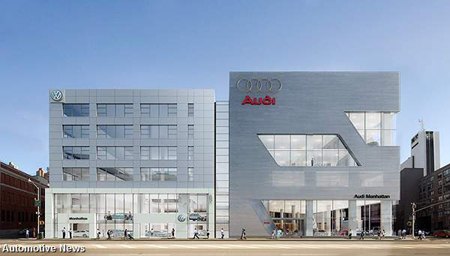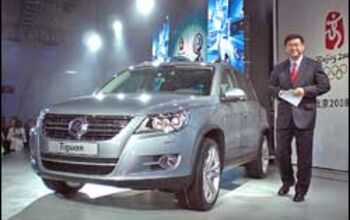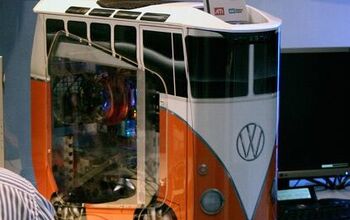VeeDub Going Retail

While other brands are busy closing down dealers, Volkswagen is buying them. They buy the big ones, to be exact. The smaller ones have been eliminated ever since yours truly has been working for VW.
In the USA, Volkswagen Group of America signed an agreement to buy the not so swank Potamkin family’s dealership in Manhattan and convert it into fancy VW and Audi stores, Automotive News [sub] writes. The new stores will be built in VW’s new “ all in white” concept.
The ugly building currently houses Potamkin GM. That will be moved five blocks south on 11th Avenue into a smaller store that was Potamkin Honda.
In Germany, Volkswagen’s disintermediation game is nothing new. Over the last few years, Volkswagen has been busy buying the “too big to fail” dealers. They are owned by a Volkswagen subsidiary, the Volkswagen Retail GmbH. A few days ago, VW announced an interest in swallowing MAHAG, one of Germany’s largest Volkswagen dealers with 30 stores, mostly in Germany’s South, says Das Autohaus. Volkswagen owns or controls dealerships in most major German cities. Ever since Volkswagen opened their Autostadt Wolfsburg in the year 2000, Germany’s Volkswagen Group dealers have been casting a wary eye on it. In the meantime, nearly half of Germany’s Volkswagen buyers pick up their car at the Autostadt, instead at their neighborhood dealer.

Bertel Schmitt comes back to journalism after taking a 35 year break in advertising and marketing. He ran and owned advertising agencies in Duesseldorf, Germany, and New York City. Volkswagen A.G. was Bertel's most important corporate account. Schmitt's advertising and marketing career touched many corners of the industry with a special focus on automotive products and services. Since 2004, he lives in Japan and China with his wife <a href="http://www.tomokoandbertel.com"> Tomoko </a>. Bertel Schmitt is a founding board member of the <a href="http://www.offshoresuperseries.com"> Offshore Super Series </a>, an American offshore powerboat racing organization. He is co-owner of the racing team Typhoon.
More by Bertel Schmitt


































Comments
Join the conversation
Question:
"I wonder how VW is getting around those state laws?"
Answer:
"The Volkswagen and Audi stores will be run by the Open Road Auto Group, which currently owns an Audi dealership in Manhattan as well as BMW, Mini, Nissan, Mazda, Acura and Volkswagen stores in New York and New Jersey."
In the last 5 years Audi and VW in the United States have really segregated their operations, giving much more indepdence to Audi. In my experiences with two dealerships in Northeast Ohio - Stoddard Audi and Fred Baker Audi, both have always gone above and beyond for me on service issues. That said, now that I am out of warranty, I have found myself an excellent independent mechanic because the prices at both shops are pretty astronomical. Great work and service, but very pricey. I think the VW move into retail, again, if done properly, is an excellent move. It's not just about pure sales, but a marketable presence and 'experience' as well. I'll reiterate someone elses' comments about the Apple stores and their wild success here in the US. If VW can make these showrooms a pleasant place to stop by to check out the latest model and not be harrassed by Stu the Salesman, they may be on to a good idea. Apple's stores are in high-profile, high-traffic locations and serve just as much to control the brand image and build awareness as they are about selling Macs, iPhones and iPods. I think this will hold even mroeso for Audi and VW since most people don't buy a $25,000 car on a whim (I've been proven wrong on that statement...), but Audi/VW will be able to build a relationship with people who stop by.
This is just a putsch to try to move the metal at MSRP. At first I wager it'll be successful, but I venture to say that the average American buyer will just go on to the closest Honda store and get that Honda steal, the Brazilian consumer will smirk and move on to the Fiat shop where he'll buy that Palio on promotion, and even the European shopper will see the wisdom in competition and get that Renault, Peugeot or whatnot and x% under MSRP. Then again it just might force manufacturer's to scale down their MSRPs.